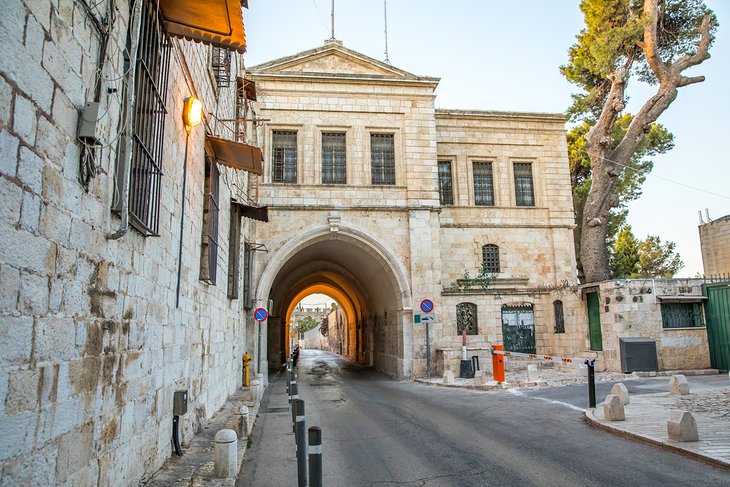The Religious Freedom Data Center (RFDC) has published its new quarterly report, “Incidents Against Christians in Israel,” covering July to September 2025, documenting 31 anti-Christian hate crimes across Israel. According to the report, 43% of all incidents in Jerusalem’s Old City targeted Armenian Christians, with the Armenian Patriarchate once again emerging as the most frequently targeted site.
This was reported on X by Kegham Balian, a Jerusalemite Armenian.
The incidents included spitting, verbal abuse, trespassing, vandalism, defacement, online incitement, and desecration of holy sites, primarily concentrated in and around Jerusalem’s Old City. Of the 31 documented attacks, 9 cases (29%) involved spitting, 8 (26%) verbal abuse, 7 (23%) online incitement, 3 (10%) vandalism of signage, 3 (10%) disrespect of a holy site, 2 (7%) defacement, and at least one instance of trespassing.
Inside the Old City, 13 incidents (42%) were recorded — 43% (6) at the Armenian Patriarchate, 23% (3) along the Via Dolorosa, 17% (2) near Jaffa Gate and David Street, and another 17% (2) in the Jewish Quarter. Outside the Old City, incidents were reported in West Jerusalem (16%), Mount Zion (6%), and other areas beyond Jerusalem (36%), including Migdal HaEmek, Latrun, the Sea of Galilee, Capernaum, and Mary’s Spring in Ein Kerem.
The report highlights a range of disturbing incidents: repeated spitting attacks on clergy, stone-throwing at the Polish Monastery, trespassing and vandalism at religious sites, racist protests and derogatory chants in public areas such as Zion Square, and widespread defacement of Christian signage and property. In several cases, police were reportedly present but failed to intervene. Formal complaints were filed, including Case 361148/2025, 390219/2025, 402740/2025, 392597/2025, and 412776/2025, yet the RFDC notes that follow-up remains limited.
The report draws a clear contrast between enforcement responses: at the Polish Monastery, police acted swiftly to stop harassment, but at Mary’s Spring in Ein Kerem, “no authority seems to take responsibility,” and the site’s signage continues to be repeatedly defaced with no investigation.
According to RFDC director Yisca Harani, the official figures likely represent only a fraction of the reality, citing widespread underreporting due to fear, resignation, and a lack of accountability. The report warns that “reports are filed, convictions are non-existent,” describing a pattern of impunity that has left Christian communities increasingly vulnerable.
Methodological Notes & Trendlines
The RFDC emphasizes that the apparent dip in the number of reported incidents compared to the previous quarter does not indicate improvement. Rather, it reflects seasonal gaps in reporting — such as clergy and monastic absences during the summer — while online hate speech and incitement have sharply risen. The report identifies this as a new and overt phenomenon on social media, with perpetrators acting openly and without fear of identification, signaling growing boldness and normalization of anti-Christian hostility.
The findings also draw a direct connection between the national mood, prevailing tensions, and government attitudes, concluding that these factors collectively foster a sense of superiority among perpetrators and contribute to attacks on non-Jews.
Context from the Previous Quarter (April–June 2025)
In its previous quarterly report, the RFDC documented 50 hate crimes, with 50% of Old City attacks concentrated in the Armenian Quarter and half of all Old City incidents at the Armenian Patriarchate — a pattern sustained in Q3 even as totals fluctuated.
About RFDC
The RFDC, an independent initiative founded in June 2023 by Israeli scholar and interfaith activist Yisca Harani, was created in response to a sharp rise in anti-Christian acts across Israel, particularly in Jerusalem. The Center operates a multilingual hotline for clergy and residents to report harassment, and collaborates with the Israel Religious Action Center (IRAC), the Rossing Center for Education and Dialogue, and the Jewish People Policy Institute (JPPI) to provide legal assistance, documentation, and advocacy. Its mission is to document, report, and help address acts of harassment and violence against Christian clergy, individuals, and institutions through data collection, advocacy, and coordination with legal and human-rights groups.
The continuation of this trend in the latest report underscores the persistent targeting of Armenian clergy and residents, as well as the ongoing failure of Israeli authorities to prosecute offenders. The report concludes with a renewed call for Israeli authorities to recognize the protection of Christian communities as essential to maintaining a respectful and shared religious space in the Holy Land.
Sources: RFDC Q3 Report (July–September 2025); RFDC Q2 Report (April–June 2025).


